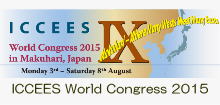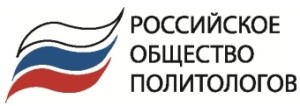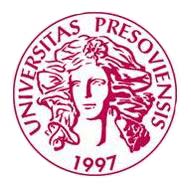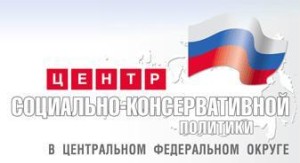ПРОЕКТЫ НАШИХ ПАРТНЕРОВ
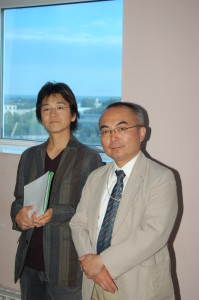 СРАВНИТЕЛЬНЫЙ АНАЛИЗ МЕСТНОГО САМОУПРАВЛЕНИЯ РОССИИ И КИТАЯ
СРАВНИТЕЛЬНЫЙ АНАЛИЗ МЕСТНОГО САМОУПРАВЛЕНИЯ РОССИИ И КИТАЯ
Проект политолога профессора Фумики Тахары
(Fumiki Tahara)
Токийский университет, Япония
(The University of Tokyo)
Поддержан Центром исследования политических трансформаций ТГУ имени Г.Р. Державина
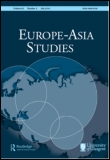
Фумики Тахара в рамках большого проекта «Comparative Research: Major Regional Powers in Eurasia», финансируемого в Министерством образования и науки Японии, дважды побывал в Тамбовской области. Он провел полевое эмпирическое исследование местного самоуправления в Знаменском районе. Его результаты опубликованы в статье: Tahara F. Principal, Agent or Bystander? Governance and Leadership in Chinese and Russian Villages // Europe-Asia Studies. 2013. Vol. 65. No. 1, January 2013. P. 75–101 (To cite this article: Fumiki Tahara (2013): Principal, Agent or Bystander? Governance and Leadership in Chinese and Russian Villages, Europe-Asia Studies, 65:1, 75-101. To link to this article: http://dx.doi.org/10.1080/09668136.2012.717367).
Показать полностью »
Во вступлении к статье Ф. Тахара описывает логику и методологию собственного исследования:
«What does ‘local self-governance’ mean in post-communist Russia and China? In order to answer this question, the article focuses on village-level governance in both countries by employing a four-fold typology of village leadership in public affairs. In both countries, the withdrawal of state power from local communities and the introduction of legislative ‘self-government’ has not brought autonomy to the local and community levels. The findings here suggest that the single ‘state agent’ category of village leadership that emerged under the communist regime is shifting to become one of the remaining three types, ‘principal’, ‘local agent’ and ‘bystander’. There was a growing tendency towards a nonautonomous type of ‘bystander’-style leadership in China and the ‘local agent’ type in Russia. This article suggests that the development of these local governance styles should not be attributed to a common transitional process departing from the communist past, but is the outcome of four factors that influence village leaders in two countries: administrative distance between local and village level, village social structure, fiscal arrangements and electoral relationships.
This article focuses on village-level leadership in China and Russia based on case studies from four villages in two countries. (The Chinese cases are Shandong Village in Penglai xian, Shandong and Jiangxi Village in Yugan xian, Jiangxi. The Russian cases are Tambov Village in Znamenka Raion, Tambov and Tatarstan Village in Kamstoe Ust’e Raion, Tatarstan.) For comparative purposes, I employ the construction of public works such as irrigation facilities, small-scale roads, gas pipes and street lamps to observe the role entrusted to formal village leaders or village organisations in providing these services.This article is a result of the ongoing project «Comparative Research: Major Regional Powers in Eurasia» (2008–2012) financed by the Japan Ministry of Education and Science. The Russian part of this article is mainly based on data collected by my field research from 1 to 16 September 2009».
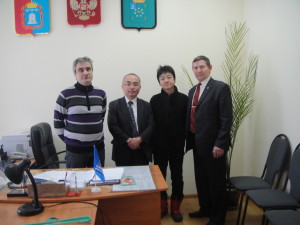
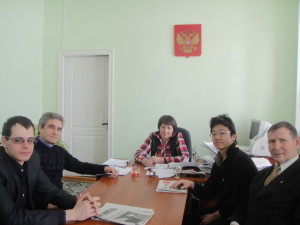
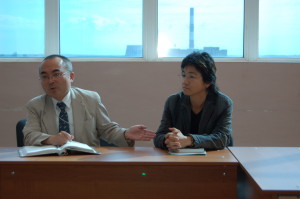
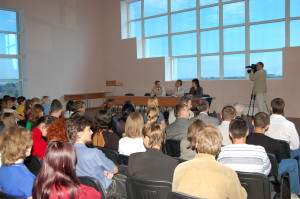
ПРОЕКТЫ НАШИХ ПАРТНЕРОВ

МЕЖДУНАРОДНАЯ БЕЗОПАСНОСТЬ:
ГОСУДАРСТВЕННЫЙ И РЕГИОНАЛЬНЫЙ УРОВНИ
(ПОСТСОВЕТСКИЕ СТРАНЫ, ЮЖНАЯ И ЦЕНТРАЛЬНАЯ АЗИЯ, КАВКАЗ, СРЕДНИЙ ВОСТОК, ЗАПАДНАЯ И ВОСТОЧНАЯ АФРИКА)
INTERNATIONAL SECURITY:
STATE AND REGION LEVELS
(POST-SOVIET SPACE, SOUTH ASIA, CENTRAL ASIA, THE CAUCASUS, MIDDLE EAST, AND WEST AND EAST AFRICA)
Проект политолога профессора Мэттью Кросстона
(Matthew Crosston)
Университет Беллвью, США
(Bellevue University, USA)
Поддержан Центром исследования политических трансформаций
ТГУ имени Г.Р. Державина
Dr. Matthew Crosston, Professor of Political Science, is the Miller Chair for Industrial and International Security and Director of the International Security and Intelligence Studies (ISIS) program at Bellevue University. Crosston has authored two well-received books, several book chapters and fifteen peer-reviewed articles in venues like the Journal of Strategic Security, International Politics, Journal of Military and Strategic Affairs, Comparative Strategy, Journal of Conflict Transformation and Security, Strategic Studies Quarterly, Central Asian Survey, Journal of Global Analysis, and Democracy and Security. His research agenda continues to address counter-terrorism, intelligence analysis, failed democratization, and cyber war/ethics. His works have been translated into Russian, Arabic, Chinese, Hebrew, Spanish, and Uzbek.
Показать полностью »
Crosston has spoken out across the globe promoting interaction between intelligence agencies that share common interests but lack connectivity, as well as fostering improved collaboration between the academic and intelligence communities. In 2013 Crosston was named the Outstanding Instructor by the International Association for Intelligence Education (IAFIE). He is currently working on volumes covering Green Intelligence and Environmental Conflict, Comparative Intelligence Communities, and a new Cyberwarfare Doctrine for Global Engagement. He has a BA from Colgate, MA from the University of London, and PhD from Brown.
Crosston’s thematic expertise has made him a specialist in the Post-Soviet space, South Asia, Central Asia, the Caucasus, Middle East, and West and East Africa. His very first research specialization, Russia, has allowed him to pursue research in the majority of the Russian Federation’s 33 subjects.
Countries:
1. United States
2. Russia
3. Georgia
4. Azerbaijan
5. Armenia
6. Ukraine
7. Kazakhstan
8. Uzbekistan
9. Turkmenistan
10. Kyrgyzstan
11. Tajikistan
12. Afghanistan
13. Pakistan
14. India
15. China
16. Iran
17. Iraq
18. Syria
19. Lebanon
20. Turkey
21. Israel
22. Saudi Arabia
23. United Arab Emirates
24. Yemen
25. Qatar
26. Bahrain
27. Egypt
28. Libya
29. Morocco
30. Liberia
31. Ivory Coast
32. Ghana
33. Nigeria
34. Sudan
35. Somalia
36. Chad
37. Uganda
38. Cameroon
39. Botswana
40. South Africa
Regions of Russia
1. Astrakhan
2. Belgorod
3. Chelyabinsk
4. Irkutsk
5. Krasnodar
6. Krasnoyarsk
7. Leningrad
8. Lipetsk
9. Moscow
10. Nizhny Novgorod
11. Novosibirsk
12. Orel
13. Omsk
14. Perm
15. Rostov
16. Ryazan
17. Samara
18. Saratov
19. Sverdlovsk
20. Tambov
21. Tomsk
22. Tyumen
23. Volgograd
24. Voronezh
25. Yaroslavl
26. Bashkortastan
27. Chechnya
28. Dagestan
29. Ingushetia
30. Mari El
31. North Ossetia
32. Tatarstan
33. Stavropol
 СРАВНИТЕЛЬНЫЙ АНАЛИЗ МЕСТНОГО САМОУПРАВЛЕНИЯ РОССИИ И КИТАЯ
СРАВНИТЕЛЬНЫЙ АНАЛИЗ МЕСТНОГО САМОУПРАВЛЕНИЯ РОССИИ И КИТАЯ






